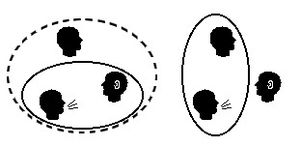Yet another post inspired by tumblr, but also by my real life conversations! This blog post will focus on the linguistic concept of "clusivity." Clusivity marks the difference between inclusive and exclusive pronouns (and therefore verb morphology), primarily in first-person plural.
It's the difference between saying, "We're going to the mall!" meaning "you and me and/or others" and "me and others but not you."
So the post I saw on tumblr a while ago (link) mentioned that the Cherokee language has inclusive/exclusive verb tenses. Again, it's not that Cherokee has different verb tenses, but more that Cherokee has a different "person" (first person inclusive plural and first person exclusive plural), which therefore affects verb tenses.
Someone else commented on the post and joked that "some languages just side-eye harder than others." While the idea of specifically denoting "we but not you" does seem rude in American culture, it probably avoids a lot of confusion and isn't rude in those languages.
Which brings me to my real life conversation.
Today at work, a coworker was talking about her upcoming trip to Las Vegas that she was taking with her fiance and their roommates. She said that her best friend ended up inviting herself along because she told her friend, "We're going to Vegas!" and her friend exclaimed, "Oh, we are?!"
We all laughed at the situation, and my coworker said she didn't know how to politely say "I meant we, not including you," and shrugged it off and figured the trip would still be fun. If English had clusivity, it wouldn't have been a problem!"
Thinking about that story and the tumblr post made me think of how there's a lot of jokes about inclusive and exclusive we in tv shows.
For example:
Children: Do we really have to clean the living room?
Parent: We are not cleaning the living room, you two are.
Or...
Older sibling: We're going to the mall later.
Younger sibling: We are?!
Older sibling: No, me and Jessica are. You're going home.
You get the picture.
Clusivity is uncommon in languages, featuring mostly in Austronesian languages, various languages in India, eastern Siberia, Mandarin, and about half Native American languages (Source).
This article (link) talks more about clusivity and the "we" issue in English, and shows how Tok-Pisin takes clusivity even further than "we and you" and "we and not you," by also have a "we two" and "we more than two" distinction as well, resulting in four different words/phrases for English's one "we"! Could you imagine?
Clusivity is not the only way English is lacking in pronouns. I did a project in college on English's lack of a true second person plural pronoun, and I'll probably make another post about that in the future.
Until then, I hope we all (we and you) have a good day!

No comments:
Post a Comment